How to choose a water meter and install it correctly: learn to count and save
The installation of individual or common house appliances for monitoring water consumption cannot be called a negative factor at all. Using a water meter can turn yourself into a plus. A useful meter will significantly reduce the amount of utility bills.
And for this you need to know all the details about the water meter: how to choose it and stay in the gain. We will tell you which water meter is best to install, describe the specifics of the operation of different devices, as well as provide useful and practical tips for reducing water consumption.
The content of the article:
How to find the best water meter
A water meter is a small measuring device that records the volume of water passing through a water pipe for a specific unit of time. He measures water in cubic meters received by the consumer in an hour or a minute - m³.
The scope is great: from household and utilities to various industries. Accordingly, with a wide range of applications, they also differ in size, design and type of action.
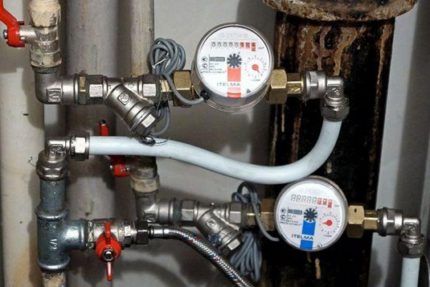
The market presents a wide range of counters of various kinds from domestic or foreign manufacturers.
By their type, water meters are divided into the following types:
- Tachometric The principle of operation is based on the placement of an impeller or turbine flow distributing in an aqueous medium, which is connected with a counting mechanism.
- Electromagnetic Their counting mechanism is based on the ability of a magnetic field to record the speed of a medium passing through a pipeline. Electromagnetic meters are used mainly in industry.
- Ultrasonic The basis for the production of measuring the volume of water is an analysis of the acoustic effect of ultrasound transmitted into the medium passing through the pipes.
- Whirlwind. To make measurements, a body of a given shape is placed in the fluid flow. The device reads the frequency of the vortices arising on the body washed by the jet during the passage of the medium. The result is proportional to the flow rate.
- Volumetric. This group of counters measures the number of revolutions of a rotating chamber having a constant volume.
Of the entire group of water meters, only tachometric and electronic are intended for domestic use, so we will dwell on their review in more detail.
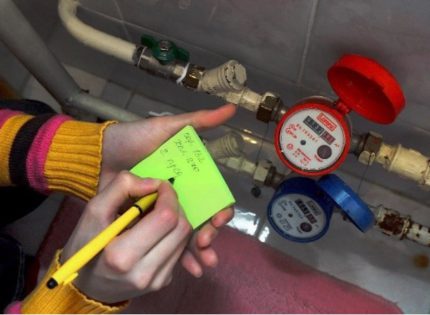
Specificity of tachometer counters
Tachometric counters are attracted by an elementary device and a similar principle of operation in complexity. Their main structural parts are an impeller or a turbine, in accordance with which devices of this category are divided into wing and turbine types.
Water passing through the meter acts on the blades of the turbine or on the impeller, which are mechanically connected with the meter. The counting mechanism simply translates the number of revolutions fixed by it in liters or in cubic meters of water.
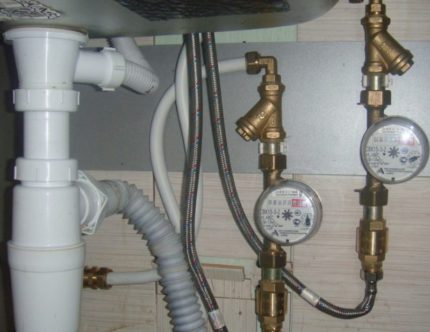
In the family of winged instruments there are multi-jet and single-jet varieties. Turbine meters, in turn, are divided into devices with a mechanical and with an induction signal reading system. Both tachometric types are additionally classified according to the location of the counting element as “dry” and “wet”.
A tachometer counter is a reliable acquisition. Its service life is at least 12 years, it makes relatively accurate measurements, and is inexpensive.
The operation of simple devices has been tested by dozens of virtually flawless years of operation in centralized water supply systems. Therefore, they are still actively in demand for installation in private and public utilities.
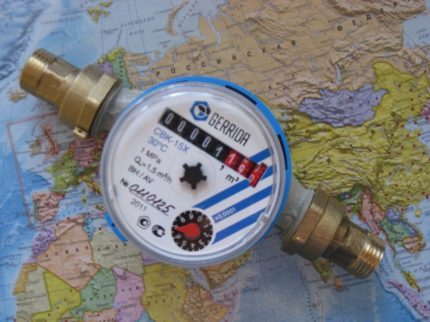
Private owners for apartments most often acquire vane instruments for measuring water. Their diameter is suitable for traditional pipelines - 40 mm, and for turbine ones it is from 50 to 100 mm. Therefore, they are chosen by the public utilities and the owners of the mansions connected to the water supply line.
The maximum volume of water counted by the impeller is only 15 cubic meters per hour. Turbine capabilities in this regard are much wider, which again affects the choice of the optimal device and the range of application.
Water meters are also distinguished by the type of installation: those that can be installed vertically and those that are horizontal, as well as universal devices that can be mounted in absolutely any position.
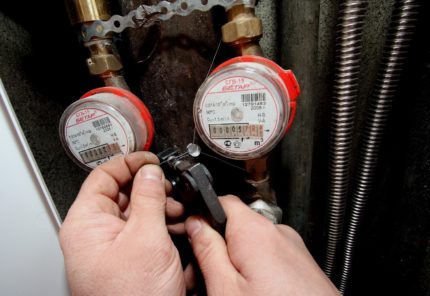
The classification of “wet” and “dry” type is based on the principle of arrangement of the counting mechanism. In the first case, it is not separated from the water. Technically simple, according to which the price is small. However, when operating in a heavily polluted environment, a “wet” meter suffers from measurement distortion.
In dry-type meters, the counting mechanism is fenced off from the water by a special non-magnetic partition. Due to this, deposits do not accumulate on the walls and working parts of the device.They are much more slowly polluted, and therefore their service life is much higher than that of wet-type meters. The price is also significantly higher.
Recall the division of tachometric instruments into single and multi-jet. During the operation of the latter, the water flowing through the impeller is divided by it into several jets. Due to this, the turbulence error of the flow is significantly reduced.
This means that a more accurate accounting of the volume of water is carried out. That's why multi-jet and more expensive than single-jet devices.
More details on tachometric meters of the amount of water that are most in demand among owners of private houses and apartments will dwell below.
Single jet water meter
The single-jet calculating device belongs to the category of dry waste. It changes the number of revolutions of the impeller under the action of a single stream of water. After information on the rotation of the impellers are transmitted to the reader through magnetic couplings. The measuring body is separated from the water, due to which it serves much longer.
Its advantages include a design that is protected from the action of a magnetic field and provides the counting mechanism with the ability to perform the most accurate measurements.
A significant plus is the possibility of additional equipment of all devices with pulse outputs. With this equipment, read meter readings remotely.
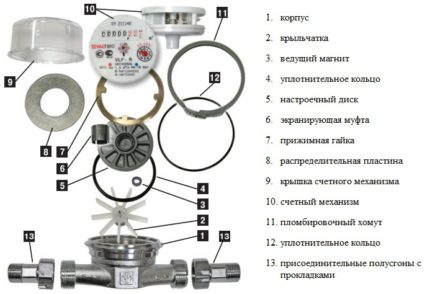
Characteristics of multi-jet meters
Multi-jet ones differ from the above type by dividing the water flow into several jets. The jet splitting device is in front of the impeller. The indicated design features contribute to the reduction of turbulence affecting the measurement error.
The advantages of multi-jet machines are ease of installation. Dismantling for the next water meter calibration made with the same ease. To do this, it is enough to separate the upper, easily removable component from the device.
Adapter sleeves are supplied to them, allowing you to install the device flush with the decorative surface.They can also be equipped with pulse outputs for reading meter readings at a distance.
Valve variety of devices
The principle of operation of the valve device is similar to those listed above. It belongs to the category of dry. But there is a useful improvement in its design - the possibility of installing a water valve inside the device is introduced, so that you can immediately shut off the water. This design feature formed the basis of the name.
The valve counter is easy to install. A weighty plus - the front indicator part of the counter can be rotated 360 °. In addition, you can rotate in three dimensions, which facilitates the ability to read data. It can also be equipped with a pulse output.
Combined water meters
In their device, there are places to be, like a vane meter, and a turbine counter located on a parallel branch. The advantages of the combination are that when the water pressure is small, it passes through the vane meter.
When the pressure increases and the vane meter can no longer cope, then its valve closes and water flows through the turbine apparatus. In current models of combined devices, both the impeller and the turbine working body are located in the same plane.
Special meters for hot water
The volume of hot water supplied is measured by conventional vane and turbine varieties. They have similar sizes and designs, only in production materials resistant to high temperatures are used.
Note that, in accordance with technical standards, a higher error in the readings of hot water meters is allowed than analogues for cold water.
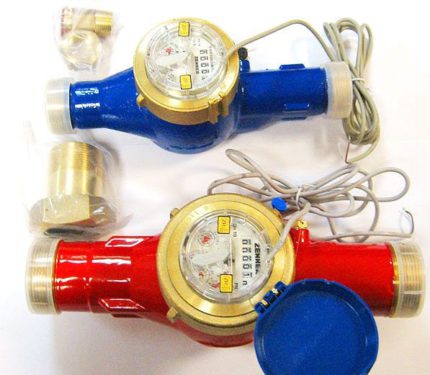
Features of electronic meters
According to the principle of operation, electronic meters are ordinary vane or turbine devices. But their design is modernized by very useful devices that read the real temperature of the water.
They are recommended to be installed where the temperature of the hot water falling at the points of water tapping to the consumer does not correspond to the norm.
It happens that in the end, barely warm water is supplied, which is considered hot according to the tariff.
Unlike standard meters that take only volume into account, electronic meters give clear information about how much cubic meters of water was used at the exact temperature that GOST indicates and is obligated to provide by the housing and communal organization.
Electronic measuring instruments are equipped with a temperature sensor system. While there is water that does not correspond to the standards of the hot category, the electronic meter perceives it as cold and displays the readings in the summation unit.
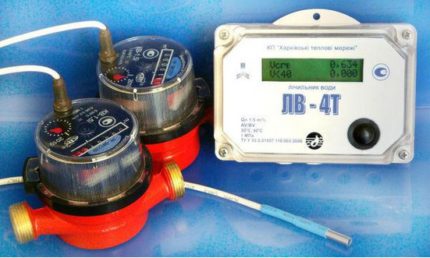
The next temperature sensor takes into account only water, which can be classified as “heated”. And now the last sensor detects hot water. True, on some electronic meters there are only two devices for fixing hot and cold water temperature limits.
All data on how much water was consumed and which temperature is entered in the summing block. However, all the information that is shown in the adder gives only the amount of water consumed, and you will have to translate it into a monetary equivalent on your own.
Advantages of the electronic meter:
- Opportunity pay bills not only depending on the volume of water, but also on its temperature.
- Install the counter display anywhere, not just next to the pipes.
- The electronic meter does not depend on voltage drops, as it works on autonomous power supply.
The electronic meter is powered by a lithium battery. It is enough for the entire period of use of the device. The battery cannot be recharged. And one more thing: it is forbidden to short-circuit it.
Which water meter is better to install?
First you need to decide what temperature the water should read the device. If you want to know the exact volume of water at the standard temperature, then installing an electronic meter will be the ultimate solution.
For those who are not interested in the difference in the actual amount of water of the standard temperature, conventional tachometric devices suitable for working in a hot environment are suitable.
If you need a counter for cold water, then installing a mechanical meter will be quite appropriate, but the same electronic one gives more accurate information about water consumption in this case.
Vane multi-jet and turbine versions with an induction reader will provide the most accurate information. “Dry” devices will last much longer than “wet” ones and provide readings with less error.
Naturally, more accurate, modernized systems are more expensive than ordinary representatives, but simple-minded types of admirers have more because of the affordable price.
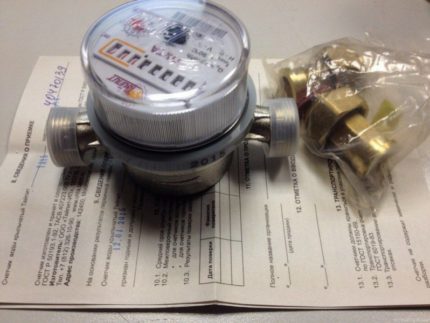
However, there is another important aspect to solving the question of which water meter will be better and more profitable to install. The wing devices are suitable for installation in pipelines up to Ø 40 mm. Turbine varieties are used to measure if pipe diameters are from 40 mm or more.
If you have any questions about choosing a water meter, read the article - Types of water meters: overview of various types + recommendations for customers
How to correctly count water?
To learn how to correctly read water from its own meter, it is necessary in practice. You should find out the total volume of water consumption per month. This requires the latest testimony for the same, but the year before last calendar period. You will find them in the receipts with the bills presented for the payment of the apartment. This figure must be recorded.
To accurately know the water consumption for the past month, you need to subtract the value of the previous month from the data taken now from the device. If you just installed water meters, then the previous indicators will be zero.
Modern water meters have a scale of 8 digits. The first five of them will be black, and the last three - red.
Pay attention only to the values of black numbers, they show the amount of hot or cold water spent. The red indicators do not need to be memorized and they are not entered into the receipt, they mean the total level of water consumption in liters.
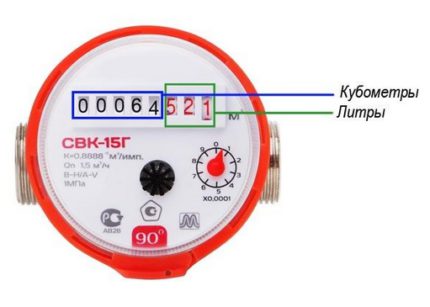
At the end of the month take readings from a water meter. Information from it can be submitted to the water utility in writing or by sending an electronic file to the company’s website via the Internet.
How to save water by the meter?
When the meter has been successfully installed and put into operation, it becomes possible to identify and eliminate sources of overspending. This is especially true for families with low incomes.
And if you take into account the constant rise in prices, the question of how to save water by the meter becomes vital.
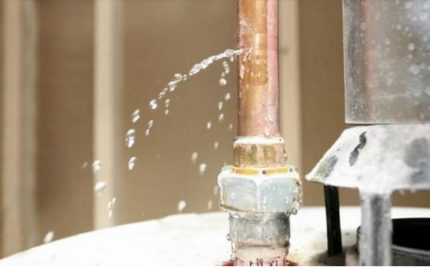
Below we will consider absolutely legal methods of saving water without harming hygiene or damage to the overall comfort of living.
Task # 1 - leak check
After the meter is installed, you should pay attention to the condition of all main pipes and devices. Usually, we "do not reach our hands" to various household trifles, such as leaks, which are almost always in every house.
It often seems to us that we can close our eyes to this. And the minimum amount of water leaks, and our financial losses can be calculated perhaps a dozen cents.
But in reality, everything is not so cloudless, since according to statistics, with a faulty drain tank, 65,000 liters of water go anywhere for a year for a year, and with a leaking tap, so fabulous 75,000 liters of water a year go.
Also do not forget about leaking pipe joints. And if you summarize everything, then a pretty impressive amount comes out in a year, which simply disappears. It seems that smudges are minimal, but "you can fill them drop by drop and by a lake."
Task # 2 - use the right mixers
It would be more appropriate to use lever mixers instead of conventional valves. Their plus is that the water closes instantly, in contrast to the valve. And if we consider that we open the crane many times a day, then in the end we will be able to save a substantial amount of money.
Task # 3 - fix the toilet
The problem is not only that the toilet can be trivial to flow. There are their separate types with two options for draining: conventional and economical. The latter will provide an economic effect of about 25 liters in water per day. For a year, this turns out to be about 7,500 liters, which you will agree is very good.
Of course, a significant overspending of water is observed with a plumbing malfunction - it is necessary in a timely manner eliminate leakage in the toilet.
Task # 4 - use a shower instead of a bath
The benefits of the shower are obvious to any reader, especially those who are given water procedures several times a day. Such an approach will help you to really save not only money, but also personal time.
As for the means, in 5 minutes of taking a shower, approximately 80 liters of water will be consumed, which is not enough to even get half a bathtub of a standard size.A similar way to save water will help you save up to 1700 rubles a year.
As an additional tip, we can offer you to buy shower heads with thin holes, which significantly reduces fluid flow per minute.
There are also shower heads with aerators on the market, they mix water with air. In addition to a pleasant massage effect, they also consume two, or even three times less water without compromising effectiveness. It is advisable to choose faucet aerator in the kitchen and in the bathroom.
Task # 4 - install a water heater
Installation heating equipment can significantly reduce the cost of hot water. Why take it from the hot water supply when you can heat it yourself. To understand how appropriate this is, it’s just worth calculating the cost of electricity and heated water.
Compare them with the cost of hot water that is supplied from a centralized network. Winning will obviously not be on the side of the latter. We also advise heating the water after 10 pm or early in the morning when the electricity tariffs are lower.
Task # 5 - think economically
Every day we brush our teeth two or more times. Usually, during the hygiene procedure, when the brush and paste are being processed, the tap remains open. It will not be superfluous to close the tap during this period, and to open it only when necessary.
It sounds, of course, funny, but when calculating the water consumption due to such a trifle, it becomes really not funny at all.
It is worthwhile to approach the process of washing dishes. The tap usually consumes 5 liters of water per minute and is open no matter what we do at this time.
You should also open it if necessary and do not put too much detergent on the dishes, as in order to wash it off, too much water is consumed. A good way to save money on washing dishes is to buy a dishwasher.
If you need to wash products, then wash them in containers than under an open tap, this will also save you a significant amount of funds per year. And one “big” washing of things will be much more economical than a few “small” ones.
When the choice of the counter is made, it is necessary to carry out its installation. Detailed information on the installation of the water meter is described in the articles:
- The order and rules for installing water meters: how to properly install and seal
- How to install water meters yourself: installation and connection diagram of a typical meter
Conclusions and useful video on the topic
A clip with a detailed description of the installation process of water meters:
Video reading algorithm performed by the measuring device:
How to reduce the cost of supplying hot water:
We have provided fundamental methods for saving water. They may probably seem too insignificant, but these little things do not require any effort from you at all, and they can save your budget significantly. Together with a properly selected water meter, they will help reduce utility costs.
Is there anything to supplement, or have questions about the choice of a water meter? Please leave comments on the publication, share your secrets of economical water consumption. The contact form is located in the lower block.

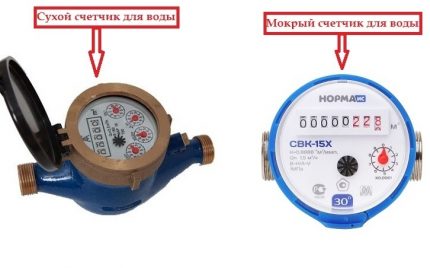
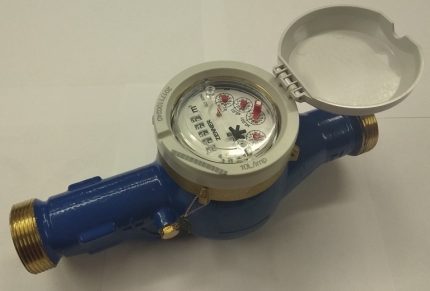
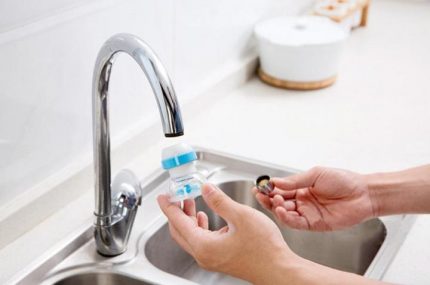
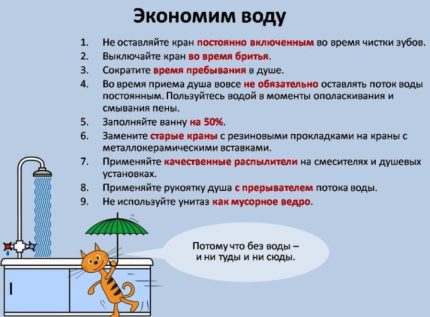
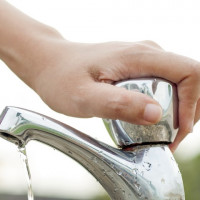 How to save and read water by the meter: modern devices and methods of saving
How to save and read water by the meter: modern devices and methods of saving 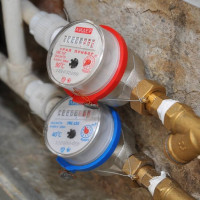 How to install water meters yourself: installation and connection diagram of a typical meter
How to install water meters yourself: installation and connection diagram of a typical meter 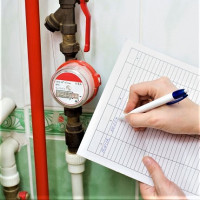 How to take water meter readings: a detailed guide to reading and transmitting the meter readings
How to take water meter readings: a detailed guide to reading and transmitting the meter readings 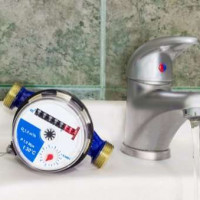 Verification period for cold and hot water meters: verification intervals and rules for their implementation
Verification period for cold and hot water meters: verification intervals and rules for their implementation 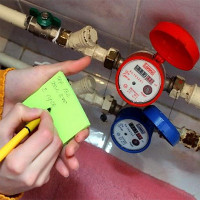 How to pay for water by the meter: specifics of calculating water consumption + analysis of payment methods
How to pay for water by the meter: specifics of calculating water consumption + analysis of payment methods 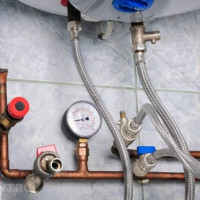 Types of water meters: overview of various types + recommendations for customers
Types of water meters: overview of various types + recommendations for customers 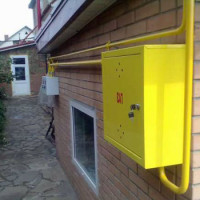 How much does it cost to connect gas to a private house: the price of organizing gas supply
How much does it cost to connect gas to a private house: the price of organizing gas supply 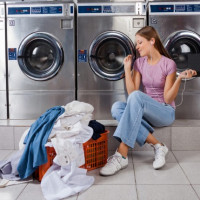 The best washing machines with dryer: model rating and customer tips
The best washing machines with dryer: model rating and customer tips 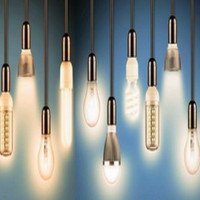 What is the color temperature of light and the nuances of choosing the temperature of the lamps to suit your needs
What is the color temperature of light and the nuances of choosing the temperature of the lamps to suit your needs 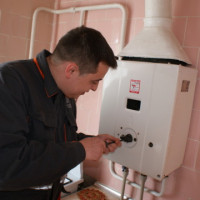 Replacement of a geyser in an apartment: replacement paperwork + basic norms and requirements
Replacement of a geyser in an apartment: replacement paperwork + basic norms and requirements
For a long time I lived without counters, then I was tired of actually paying for what I use little. Shoveled a bunch of information on the Internet, literally became a guru in this topic, as far as possible for a woman who is far from such issues in normal times. Finally bought it. Electronic, expensive. Exactly what I wanted and revealed as the best.
Plumbing from the Criminal Code. Which during the installation process one counter was successfully broken ... I, of course, understand everything - they, apparently, put several popular models / types. And then he returned the money to me for the device ... But it is so disappointing for the unprofessionalism of those who should understand this topic ... As a result, I returned the counters (except for the broken one) and bought cheap mechanics. But this monster from the letter M did not refund the money.
The time has come to check the meter for hot water, I went and looked what would happen if this was not done. It turned out that you have to pay according to the standard, which is 2.4 cubic meters per person. In July, they saved a lot of water and poured 5.5 cubes together. In winter, it takes 8-10, also saving.
Maybe the fact is that our hot water only flows in the evening, the rest of the time it is 45 degrees, some kind of machine in the basement decides so. That is, it is profitable for us to live without a counter, even taking into account the increasing coefficient. At the entrance, most do not.
He worked for almost 20 years at the Center for Standardization, Metrology and Certification. During various inspections, Betar water meters showed themselves best. I installed these at home. Devices work with almost perfect accuracy, plus they are protected by antimagnetic seals. With proper handling, a very good time period will serve.
Maybe the Betar water meters themselves are pretty good, but it is too painful to find defective products. Moreover, before the zero years I had not heard anything bad about them, but in the last 10 years, several friends at once broke down without having worked out a six-year term.
In my opinion you are a bit confused “wet” with “dry”. Please clarify the information and the caption under the pictures.